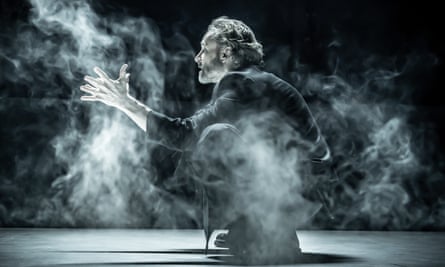This is the second starry adaptation of Shakespeare’s Scottish play within the month, both boasting high concepts. Simon Godwin’s show premiered in a warehouse with Ralph Fiennes and Indira Varma as the crown-usurping couple. This production is just as celebrity-driven, with David Tennant and Cush Jumbo as its leads. But where Godwin’s show flirted with immersive theatricality, half successfully, Max Webster’s concept combines immersion in sound with a fantastically creepy filmic expressionism.
We channel the sounds of the play through binaural headphones. The use of aural three-dimensionality here, designed by Gareth Fry, is incorporated with live folk music, which brings Celtic sounds while the action takes place on a central stage and glass box behind it.
As fanciful as that sounds, there is an intensely focused vision behind it. Superbly directed by Webster, it is full of wolfish imagination and alarming surprise. The action takes place at under two hours’ traffic yet it is not a classically fevered Macbeth but coolly creepy, and horrifying.
Sound, in Shakespeare’s text, has great disturbing significance. That is made manifest here. The 3D headphones magnify every creak and whimper. We hear the cold clink of metal as Lady Macbeth snatches the daggers with which Macbeth has killed Duncan (Benny Young) to return them to the crime scene.
The witches take the concept a step further and appear in sound rather than form. They are sinister in their absence, invisibly roaming in the vapour and smoke around the stage, present as a sibilant chorus of whispering voices played by the entire cast – an ingenious way to suggest that they represent the ever-present murderous voice in Macbeth’s head. They moan, giggle and flap crow-like in our ears, bringing an uncomfortable intimacy.

The headphones allow Tennant and Jumbo to talk in low conspiratorial tones. Tennant is a wiry, austere, self-righteous warrior who turns his intelligence into calculating outrage. He makes this Shakespearean role look effortless as he murmurs his soliloquies and we hang on his every word. There is steel and cunning to Jumbo’s Lady Macbeth, dressed in virginal white throughout, and a sense of purity remains around her despite her plotting.
Paradoxically, hearing the dialogue through headphones brings intimacy but one reminiscent of film with an augmented Dolby sound, as if these characters are not talking in real time.
The expressionist staging conjures so much through choreography, light and sound. At times it resembles the magnificently spare Gothicism of Joel Coen’s adaptation. Rosanna Vize’s bare black-and-white set has the same palette as that film, along with a steel-and-black variation of kilts and jumpers that conjure a hybrid ancient-modern aesthetic.
Bruno Poet’s lighting shines hard spotlights across the gloom. The cast, along with musicians, stand in a lineup in the glass box, a row of pale staring faces that look as if they are floating, disembodied in darkness. In some scenes they bang the glass or press their faces against it unnervingly.
The horror and tragedy hit all the marks too, from the killing of Lady Macduff (Rona Morison) and children, taking place in pitch darkness and capturing every sound of their last gasps, to Macduff’s (Noof Ousellam) disbelief at the news and the terrible sense of fate in the final fight scene.
The production is so focused, and so self-assured, that it seems to throw a bizarre meta-fictive curveball, straight after Duncan’s murder in which the Porter (Jatinder Singh Randhawa) breaks out in broad modern Glaswegian vernacular in what seems like his own standup routine. Yet the production has such command that it somehow pulls it off.
It’s a cool, cocky and utterly arresting production. Tennant’s Macbeth is vicious and yet he makes us feel his character’s tragedy acutely.
Plays until 10 February 2024

